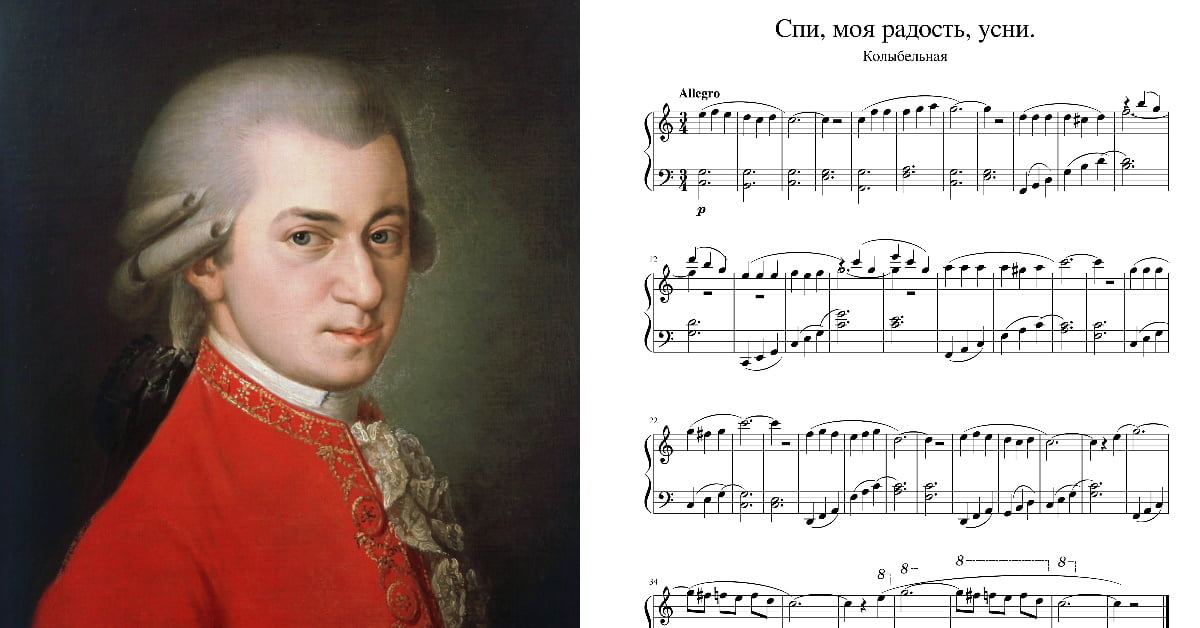Many sources claim that the lullaby music, to which more than one generation of Soviet children fell asleep, came from the pen of the great Austrian composer. We checked if this is true.
The fact that the authorship of the melody, well known to millions of people, belongs to Wolfgang Amadeus Mozart can be read on many sites with collections audio recordings, texts songs and even in printed notes. The information got into the magazines "Murzilka" (1965), "Primary School" (1966) and a number of other publications. There is a separate section dedicated to the lullaby on Google Play Market application, the description of which says: ““Sleep, my joy, fall asleep...” is the famous lullaby of W. A. Mozart, which has been helping children all over the world fall asleep for several centuries.”
It’s hard to argue with the last fact - indeed, this song is known not only in Russia. Under the German name Schlafe, mein Prinzchen, schlaf ein (“Sleep, my prince, go to sleep”) it is well known and quite popular abroad. They even sing a lullaby opera singers.
And it was “prince” that was mentioned in the first Russian translation of the song’s lyrics, made in 1924 Sofia Sviridenko. However, there was also “joy” in the poem, but at the end. Only a year passed, and in the next edition the “prince” was replaced "Darling" - after all, this happened in a country that had just overthrown the autocracy. The option with “beloved” did not catch on, either because it was too intimate for a lullaby, or because it was impossible to sing such a song to a girl. One way or another, but the gender-neutral line “Sleep, my joy, sleep” (supposedly borrowed from Balmont) soon rose to the title and remained there forever. Completed by Vsevolod Rozhdestvensky in 1932, completely new translation lullaby (“Sleep, my son, without worries”) could not compete with Sofia Sviridenko’s text.
Over the following decades, the lullaby became truly folk, and her appearance in the 1982 cartoon "The Right Remedy" (performed by Klara Rumyanova) only cemented this status. The pinnacle of fame for the lullaby was its use since 1986 in the intro of the program “Good night, kids!” (performed by Elena Kamburova):
As for the fate of this lullaby in its homeland, there are no discrepancies with the authorship of the text. It was created by a German poet and playwright Friedrich Wilhelm Gotter (1746–1797) for the play Esther, staged in Leipzig in 1795. This play was a modern adaptation of the biblical Book of Esther, and the lullaby was performed by a choir of the queen's maids (hence the prince in the original).
But with music everything is much more interesting.
In 1825, Mozart's widow Constance sent this lullaby to the publisher of Mozart's works, remarking: "The work is very nice, Mozartian in all respects, spontaneous, inventive." Three years later, the lullaby was published as an appendix to the biography of Mozart that Constance wrote with her second husband, Georg von Nissen. From that moment on, the lullaby was included in Mozart’s collected works, and the German poet Matthias Claudius (1740–1815) was listed as the author of its text. In addition, work number K350 was included in Köchel catalog (1862) is the most authoritative index of the works of the great Austrian composer, numbering in which to this day is the main identifier of the master’s works.
However, Mozart’s sister Maria Anna (known in the family as Nannerl) did not confirm the version of her brother’s authorship, and Constance herself eventually doubted it. There were musicologists who argued that the lullaby’s music was not at all similar to Mozart’s: it was too simple and unpretentious, even the most primitive Mozart songs were more complex. In addition, specialists indicated for violations in voice control, which the pedantic Mozart would never have allowed. The art historian carried out particularly painstaking work Max Friedlander, who, at the end of the 19th century, first discovered that the text of the lullaby was taken from Gotter’s play, and then provided moderately convincing evidence that he wrote the music for it and published it in 1796 Bernhard Flies, Berlin doctor and amateur composer. Little is known about Fliess: he was born around 1770 into a family of Jewish businessmen, was baptized in 1798 and organized a charity concert in Berlin in memory of Mozart.
It would seem that from now on Mozart should have been replaced in all editions of the lullaby by Flis. However, this was not the case. Several decades passed, and Hitler came to power in Germany. The ideological soil he sowed proved fertile for the rise of musicologists such as Herbert Gehrigk. This figure, who gradually came to the fore in the musical politics of the Third Reich, is notorious for creating "Dictionary of Jews in Music" - a publication designed to prevent the “accidental” performance of works by Jewish and partially Jewish composers. In addition, the dictionary, through lies and deliberate falsification, devalued the role of such major musical figures of “unworthy” origin as Mendelssohn, Meyerbeer and Mahler. It was Gerigk who, in one of the issues of his magazine “Music at War” for 1944, stated that the version of the authorship of Fliess is nothing more than a “monstrous falsification” that was needed by the “Jew Max Friedlander” to take away the authorship of the lullaby from the Aryans.
Years have passed since then, power has changed in Germany, and Bernhard Fliess began to be mentioned more and more often as the creator of the famous melody. In 1988 showed up another contender for authorship is a German composer Friedrich Johann Fleischmann, who died in 1798 at the age of 32. Fleischmann arranged parts from some of Mozart's operas for wind ensemble, and in 1796 he published music for Gotter's lullaby, the beginning of which almost coincides with Fliess's music. And if Fleischman can really be called a serious competitor to Flis (there is even theory, that Friedrich could have conveyed the notes to Constance, his fellow countrywoman in the city of Mannheim), then the version of Mozart’s authorship is supported by fewer and fewer specialists these days. In particular, in the Köchel catalogue, the work numbered K350 these days is usually either absent, or indicated under by Flis.
Thus, the author of the melody for the song “Sleep, my joy, sleep” is most likely one of two contemporary composers of Mozart: Bernhard Flies or Friedrich Fleischmann.
Most likely not true
Read on the topic:
2. Hermann Abert. W.A. Mozart.
If you find a spelling or grammatical error, please let us know by highlighting the error text and clicking Ctrl+Enter.







